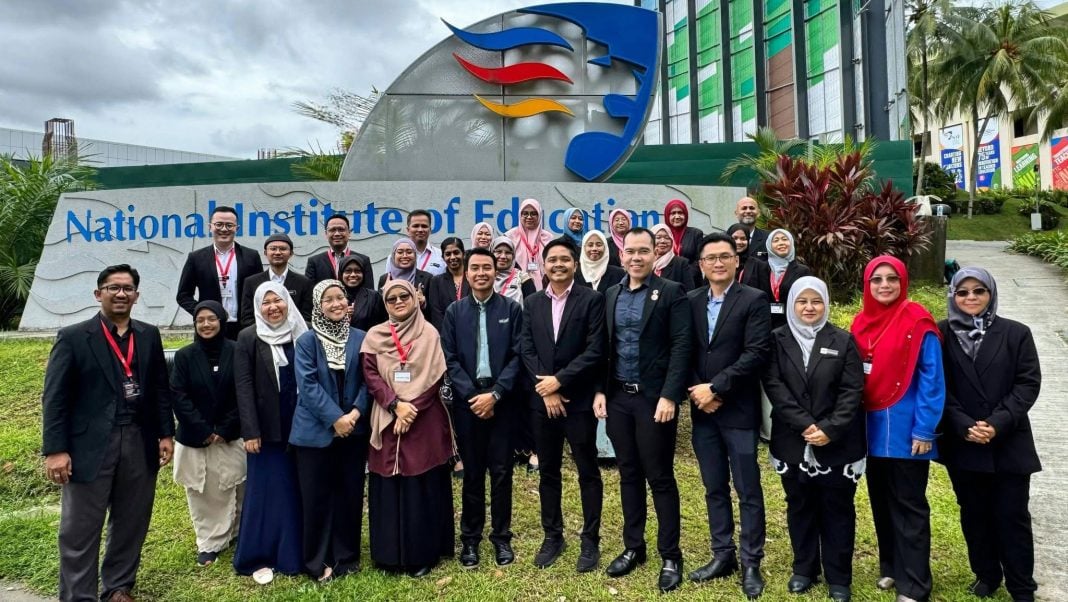MALAYSIA: Johor is making an unprecedented move to reform its education system by turning to Singapore’s National Institute of Education (NIE) to upskill local teachers — a bold step that could reshape the state’s economic future. With a strong focus on STEM (science, technology, engineering and mathematics) and English language instruction, the initiative aims not only to raise academic standards but also to stem the tide of brain drain that has long plagued Malaysia’s southernmost state.
This pilot effort, known as the Bangsa Johor Schools programme, was spearheaded by the Regent of Johor, Tunku Ismail Sultan Ibrahim, in 2024. Frustrated by the national system’s inertia, he declared: “If it (a review of the education system) cannot be done at the national level, let Johor be the first state to change the school syllabus,” The Straits Times (ST) reported.
First batch of teachers trained at Singapore’s NIE
In April 2025, Johor sent its first batch of 30 educators to NIE’s campus in Boon Lay for a week-long training programme, the first of its kind between Singapore and a Malaysian state. The group included primary and secondary teachers, lecturers and education officials, all commuting daily from Johor’s Iskandar Puteri.
“The goal is to facilitate the sharing of best practices and fresh perspectives that the teachers can bring back,” said Ms Lim Hwei Ming, senior assistant director of business development at NIE International, in a statement to ST. The second and third groups, focusing on English-language teaching and learning assessments, are set to undergo similar training in May and June.
Education reform with economic intent
Johor’s strategy is clear: Improve the quality of teaching, especially in STEM and English, to develop a future-ready, skilled workforce. The ultimate aim is to reduce the state’s reliance on low-wage jobs in neighbouring Singapore and instead retain talent to drive growth within Johor.
Top state education official Mr Aznan Tamin explained that students in the pilot programme’s four selected government schools will complete at least 112 hours annually in STEM subjects, almost double the national average. “English proficiency and higher standards of assessments will also be introduced, with the aim of 100% of students progressing to higher education,” he said in March, as quoted by ST.
The Johor government has earmarked RM6.22 million (S$1.85 million) in its 2025 budget to support this pilot. This budget covers 4,300 students and 212 teachers across the four schools in Johor Bahru.
Addressing brain drain at its roots
The urgency of reform stems from Johor’s ongoing brain drain. Despite producing nearly 500,000 higher education graduates in 2024, the state also sees thousands of youths abandoning formal education in favour of low-skilled, better-paying jobs across the Causeway.
More than 900 students skipped the most recent SPM (equivalent to the O-level) exams, many opting for jobs in Singapore’s F&B and hospitality industries, ST reported. “These students preferred taking up jobs in Singapore, even if they were low-skilled positions, as the pay was lucrative,” Mr Aznan noted.
The reform effort also complements the Johor-Singapore Special Economic Zone (JS-SEZ), which aims to promote cross-border collaboration in 11 sectors, including manufacturing, digital services, healthcare, and tourism.
“This pilot (Bangsa Johor Schools) is the first step towards a better future for education for the citizens of Johor, that is more advanced and competitive,” said Menteri Besar Onn Hafiz Ghazi in July 2024, as quoted by ST.
Hope for a future built on homegrown talent
For teachers, the experience has already been eye-opening. “I hope when (the fruit of) this project is realised, young Johoreans can grow, learn, work and contribute back in their home state,” said Madam Yogeshwari Chelliah, head of chemistry at SMK Kota Puteri 2 in Pasir Gudang.
While she acknowledged similarities in content between Malaysian and Singaporean training, she praised NIE’s approach for encouraging students to explore multiple solutions to a problem. Fellow teacher Mohd Fazly Mohd Salleh added: “Students need to look around what’s happening in Johor and realise their potential.”
Public support and pride in pioneering efforts
The Bangsa Johor Schools pilot has not only drawn the attention of policymakers and educators but has also sparked a wave of public pride and support across social media and local platforms.
Many Malaysians have expressed optimism and encouragement for the programme’s long-term goals. One comment summed up the hopes of many: “May this pioneer school project be made easy and achieve its purpose.”
Teachers participating in the NIE training have also received warm praise, with messages such as “Well done and congratulations to the teachers of Bangsa Johor,” acknowledging their role in shaping the initiative’s success.
Others remarked on the rare opportunity afforded to the selected educators: “How lucky are those who are chosen.” These sentiments reflect a growing belief that Johor’s investment in human capital may well yield lasting change, both inside and beyond the classroom.
Controversy over curriculum and language policy
Not everyone has welcomed the initiative without reservation. Some critics argue that Johor is stepping outside national policy boundaries, especially regarding the use of English. Education leaders, however, maintain that the national syllabus remains intact.
“No education system out there is perfect, but we believe the first step to improving schools is to improve ourselves,” Dr Yap Soon Li, assistant director at Johor’s education department, was quoted as saying by ST.
In February, Mr Aznan clarified that STEM subjects will continue to be taught in Malay and that enhancements are being made to learning methods and teacher training, not the curriculum itself.
From bold experiment to blueprint for change
The Bangsa Johor Schools programme may still be in its infancy, but its ambition is unmistakable. Drawing inspiration from Singapore’s globally respected education model, Johor is betting big on long-term reform as the key to economic self-sufficiency and social mobility.
Whether this will become a blueprint for other Malaysian states or remain a unique experiment in education diplomacy, one thing is clear: Johor is not waiting for change; rather, it is leading it.

